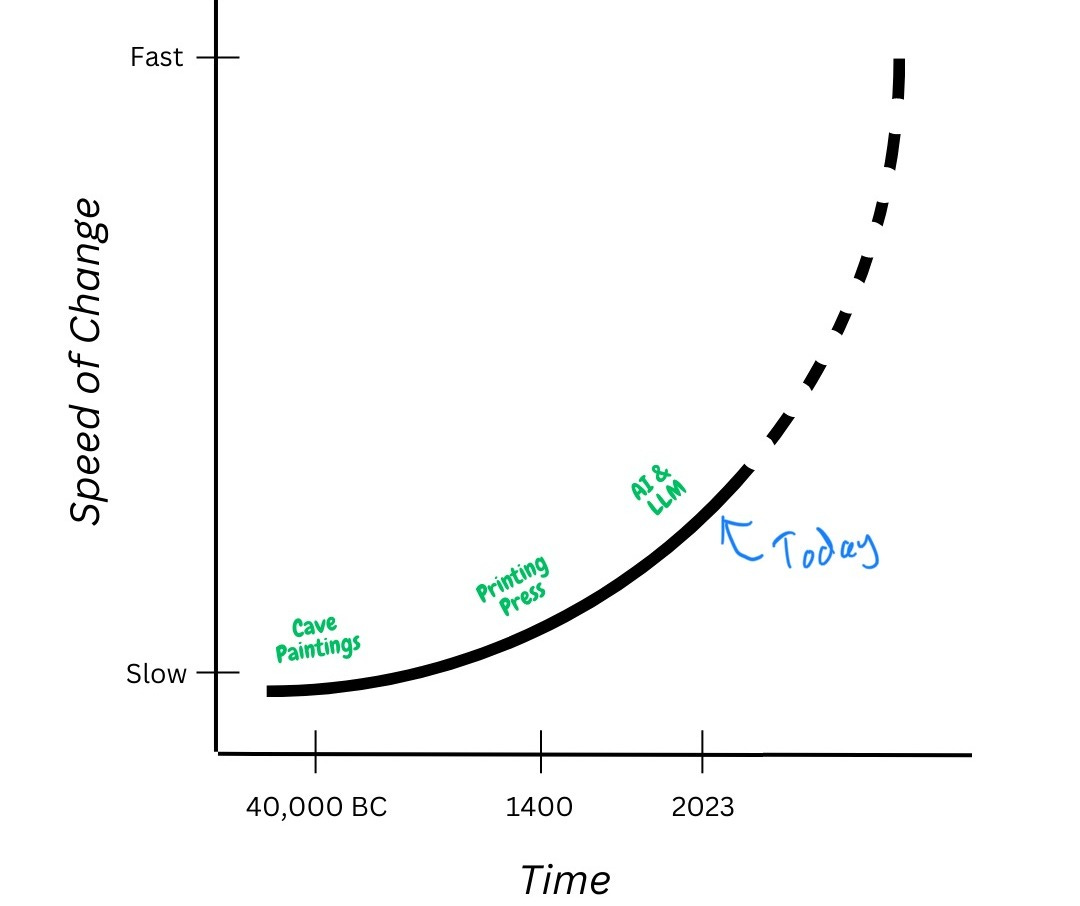AI Is Not A Strategy
Building a company in the age of exponential innovation
Happy Thursday, 👋
In 1454, great writers were successful because of their mastery of content, but in 1455, everything changed when Gutenberg introduced the printing press. Suddenly, the ability to mass-produce books shifted the competitive advantage to those who could distribute their work more broadly. Over the next fifty years, as the printing press became more accessible, the advantage of mass production diminished, and once again, authors with true wordsmithing talent rose to the top. Technology had leveled the playing field, but only for a short time. This cycle mirrors what we have seen several times throughout history including electricity, the steam engine, and now AI.
Too often, companies present ideas that merely apply AI to improve existing processes and procedures. These startups often struggle to raise capital, confused about why their applications of AI are not enough to capture investor interest. The reason is simple: AI, like the printing press, is not a business model in itself. Instead AI acts as a force multiplier. Successful companies are built on sustainable and defensible strategies, not on temporary technological advantages.
Value Creation vs. Value Capture
Throughout history, the speed of technology adoption has increased exponentially. It took humanity over 40,000 years to go from cave paintings to the printing press, but less than 600 years from the printing press to the first email. Now, within just 50 years, we have gone from that first email to widespread AI integration.
While technology's ability to create value for society accelerates, businesses must do more than simply create value, they need to capture it. When the printing press emerged, even mediocre writers could find some success by mass-producing their work at a lower cost. For a time, this allowed them to increase their visibility, even if their writing wasn’t extraordinary. But as the technology became widespread, skilled writers with true talent became easier to identify, and their defensible skillsets allowed them to capture the real value of this societal shift. The same dynamic is at play with AI today. Startups relying solely on AI to differentiate themselves will struggle in the long term, as competitors can easily replicate their tech-based advantages.
Building a Moat = Strategy + Technology
Investors and startups alike need to focus on building a business that has both a moat and a strategy. Last year, we coined the term "Moategy" to describe this synergy. Leveraging AI can accelerate the implementation of highly complex strategies, reduce time to market by allowing companies to test multiple scenarios simultaneously, help with coding, and ultimately, reduce burn rate by multiplying team efforts. However, AI alone doesn’t build the moat.
A moat represents the unique, defensible aspects of a business that make it difficult for others to compete. Startups should use AI to strengthen their existing moats but should not rely on it as the moat itself. Founders who understand how to leverage technological shifts to create temporary advantages must also have a plan to build a more enduring and defensible position in their industry. Applying AI to an existing process or procedure may provide an initial advantage, but long-term success requires more than just efficiency gains. Companies must find ways to transform those short-term wins into a longer-term strategy that is difficult for competitors to replicate.
Leveraging AI as a Force Multiplier
AI should be seen as a tool that accelerates a company’s unique capabilities, not as a substitute for them. The companies that will thrive in the AI era are those that develop rare and valuable capabilities that can be enhanced by AI but not replaced by it.
Consider our printing press discussion once more: while it gave unskilled writers a brief opportunity to reach more readers, it ultimately amplified the success of those who had already honed their craft. In the same way, AI will multiply the impact of businesses that have built something truly unique and defensible.
Conclusion: Defensibility is the Key to Long-Term Success
When evaluating new companies or ideas, ask whether the concept is defensible and strategic or simply an application of the latest technology. Many startups are applying AI in efforts to scale industries, but only those using AI as a force multiplier to accelerate defensible business models will find lasting success.
In this fast-evolving landscape, the most successful companies will not be those that rely on AI as their only differentiator, but those that use it to supercharge their already robust and defensible strategies.
Wishing everyone a great weekend,
-The Caymont Ventures Team.


